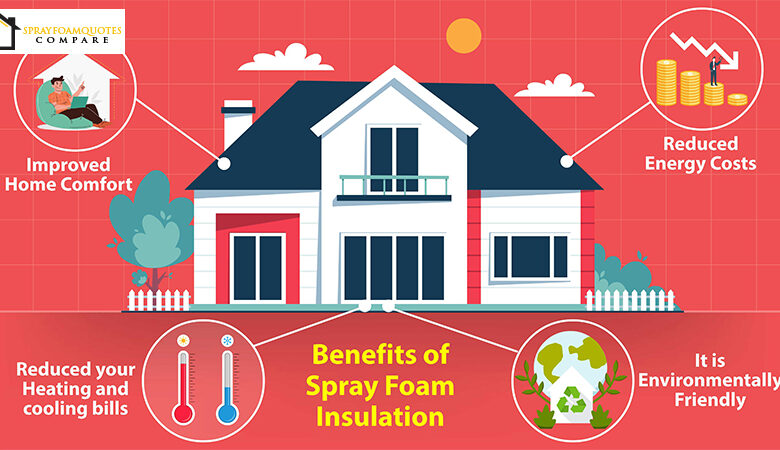The Benefits of Spray Foam Insulation

Spray foam insulation is a popular choice for homeowners and builders looking to improve energy efficiency and comfort in residential and commercial buildings.
This type of insulation is first applied as a liquid which later expands into a solid foam, filling even the smallest cracks and crevices for an airtight seal.
You can choose from two types, open and closed cells.
Open-Cell Spray Foam
Open-cell spray foam is low-density and a spongy material that is great for reducing airflow and noise. The open-cell structure lets air flow through while still providing insulation.
Some main benefits of open-cell foam are:
- affordable cost compared to closed-cell
- effective sound-dampening properties
- allows moisture vapor to pass through
- typical R-value around R-3.5 per inch
Open-cell foam is commonly used for interior applications like –
- wall cavities
- attic spaces
- crawl spaces
– or places where moisture and vapor control are not much of an issue.
Closed-Cell Spray Foam
Closed-cell spray foam is a higher density, rigid material with a closed-cell structure that blocks airflow completely.
The dense composition gives superior insulation and moisture resistance.
Some advantages of closed-cell foam are:
- better R-value, between R-6 and R-7 per inch
- acts as an air and moisture barrier
- adds structural reinforcement
- resists heat transfer more effectively
Closed-cell foam is ideal for exterior applications like:
- roofing
- exterior walls
- areas prone to moisture intrusion
It costs more upfront, but it insulates better, so it is worth it.
Benefits of Spray Foam
Regardless of the type used, spray foam insulation comes with several advantages over traditional batt or loose-fill insulation:
1. Air Sealing: Spray foam expands to fill all gaps and cracks, creating an effective air barrier that reduces air leakage and drafts.
2. Energy Efficiency: With its high R-value per inch, spray foam excels at reducing heat transfer, lowering energy costs for heating and cooling.
3. Moisture Control: Closed-cell foam acts as a vapor barrier, preventing moisture intrusion that can lead to mold and mildew growth.
4. Structural Reinforcement: The rigid nature of spray foam – especially closed-cell – adds strength and durability to the building structure.
5. Longevity: Spray foam insulation does not settle or deteriorate over time, maintaining its insulating properties for the life of the building.
6. Versatility: Spray foam can be used in walls, attics, crawl spaces, and other hard-to-reach areas for thorough coverage.
Installation Process
While DIY kits are available, spray foam insulation is best installed by trained professionals. There are specialized equipment and safety precautions the job demands.
The installation process usually goes like this:
- Preparation: Clearing the area, covering surfaces not to be insulated, and setting up ventilation.
- Mixing: The two liquid components are heated and mixed at the application nozzle.
- Application: The foam is sprayed onto surfaces, expanding rapidly to fill cavities and crevices.
- Curing: The foam is allowed to fully cure and harden, typically within a few hours.
- Trimming: Any excess foam is trimmed flush with framing for a clean finish.
Proper protective equipment, including respirators and full-body suits, is basic during installation due to the potential health hazards of the chemical components.
Cost Considerations
Spray foam insulation costs more up front than other types of insulation, but it can save you money in the long run by lowering your energy bills and making your home more comfortable. Closed-cell foam is generally more expensive than open-cell, but its superior insulating properties may justify the added cost in certain applications.
For this kind of insulation you need experienced professionals who can assess your specific needs and suggest the most appropriate type and application method.
With its exceptional insulating properties, air sealing capabilities, and durability, spray foam insulation is an investment that can pay dividends in energy savings and comfort for years to come.
For More Information, Visit Isothane
https://isothane.com/spray-foam-insulation/
https://isothane.com/open-cell-closed-cell-spray-foam-insulation/
You may also read

